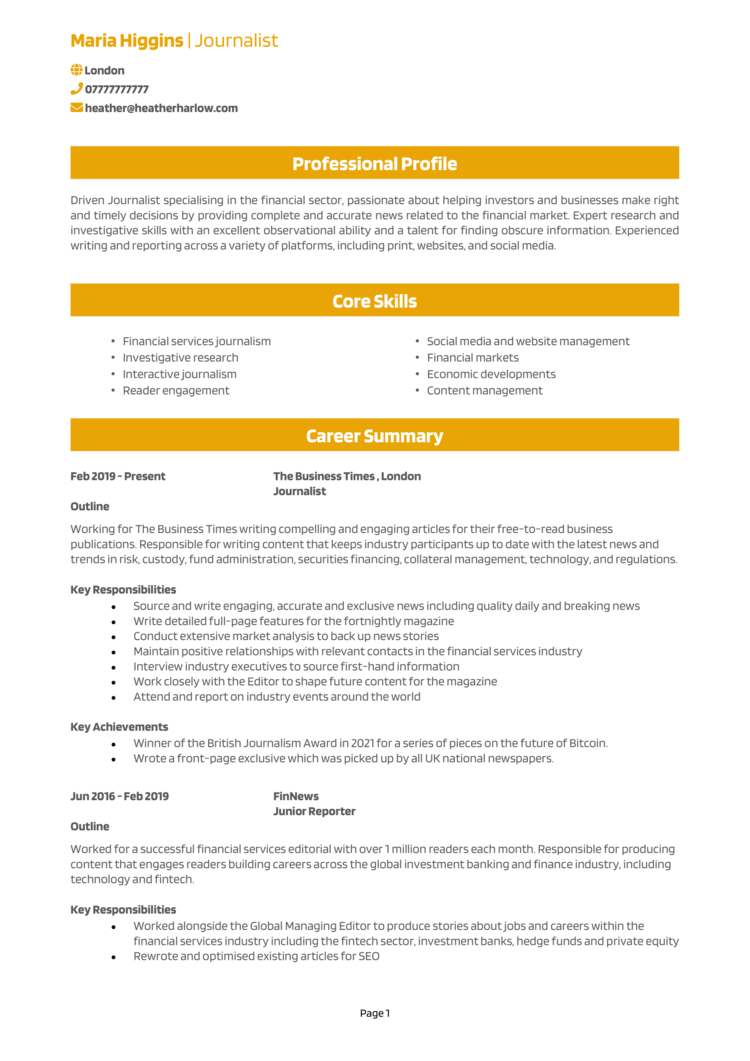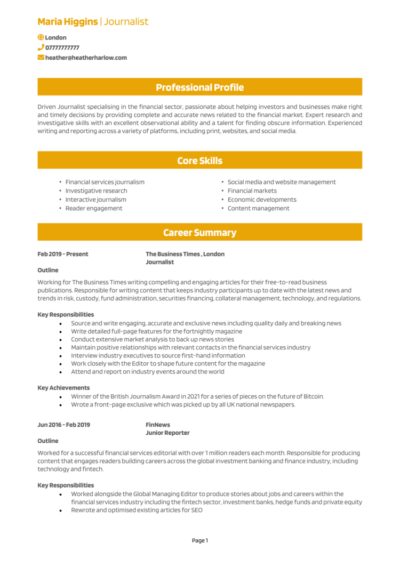As a journalist, you know how to craft a compelling story, uncover the facts, and deliver information that captivates your audience. But now it’s time to turn the spotlight on yourself – and your CV is the headline.
This guide, complete with 5 Journalist CV examples, will show you how to write a CV that highlights your investigative skills and knack for storytelling. Your new CV will get you noticed, land interviews, and launch you into your next big scoop.
Journalist CV example

Broadcast Journalist CV example

Freelance Journalist CV example

Fashion Journalist CV example

Reporter CV example

How to write your Journalist CV
Learn how to create your own interview-winning Journalist CV with this simple step-by-step guide.
Think of your CV as your greatest pitch yet – except this time, you’re the story. Whether you’re pitching to a national news outlet, a niche publication, or an online platform, a good CV needs to showcase your ability to inform and engage while meeting tight deadlines.
In this guide, you’ll learn how to structure and format your CV, highlight your writing and research skills, and position yourself as the ideal candidate for any newsroom.
Journalist CV structure


Your CV structure needs to be as organised as your research notes before a big feature. A disorganised CV is like an unfinished draft – confusing, hard to follow, and unlikely to make it to print: keep the focus on your skills, not your layout mistakes.
Here’s how to structure your Journalist CV:
- Name and contact details – Place contact details at the top so editors can easily get in touch. Including a picture of yourself is entirely optional.
- Profile – Start with a summary of your career highlights, key skills, and journalistic focus.
- Core skills – Showcase abilities like investigative reporting, feature writing, or video editing.
- Work experience – List your roles in reverse chronological order, focusing on significant stories and responsibilities.
- Education – Include your qualifications in journalism, media studies, or other relevant fields in your CV.
- Additional info – Optionally, mention hobbies and interests like blogging, podcasting, or volunteering that show your passion for storytelling.
Journalist CV format


Your CV format should reflect the clarity and professionalism you bring to your writing. A clean, easy-to-read layout ensures that editors and recruiters can focus on your experience and skills.
Here’s how to format your Journalist CV effectively:
- Bullet points – Break down key information into bite-sized pieces for easy skimming.
- Divide sections – Use clear headings to organise your experience and achievements logically.
- Use a clean font – Choose a professional font that makes your CV readable and polished.
- Keep it the right length – Stick to no more than 2 pages – enough length to highlight your skills and experience without overwhelming the recruiter.
Journalist CV profile


Your profile is your headline – it needs to grab attention immediately, and keep the reader reading. Use this space to highlight your journalistic expertise, career achievements, and professional aspirations, emphasising the value you’d bring to a new role.
Journalist CV profile examples
Profile 1
Experienced Journalist with over eight years of expertise in investigative reporting and feature writing for national publications. Skilled in uncovering compelling stories, conducting in-depth research, and producing high-quality articles under tight deadlines. Proficient in digital storytelling tools, data journalism, and multimedia content creation. Known for delivering accurate and impactful content that resonates with diverse audiences.
Profile 2
Proficient Journalist with five years of experience in broadcast and digital media, specialising in breaking news coverage and live reporting. Adept at interviewing key stakeholders, verifying information, and presenting engaging stories across multiple platforms. Experienced in video editing, scriptwriting, and managing social media channels to increase audience reach.
Profile 3
Dedicated Journalist with four years of experience in local and regional news, focusing on community-based reporting and human-interest stories. Skilled in conducting interviews, building source networks, and producing engaging written and video content. Proficient in using CMS platforms and Adobe Creative Suite to manage online and print publications effectively.
What to include in your Journalist CV profile
Here are some tips on what to include in your Journalist CV profile:
- Where you’ve worked – Mention the publications or media outlets you’ve contributed to.
- Your top qualifications – Highlight degrees or certifications in journalism, media, or communication.
- Essential skills – Note key abilities like investigative reporting, multimedia storytelling, or social media management.
- Career highlights – Briefly mention any significant stories you’ve worked on or awards you’ve received.
- Future goals – Reference ambitions that align with the role, such as covering specific beats or managing editorial teams.
Core skills section


Think of your core CV skills section as your byline – it tells everyone exactly what you’re known for and what you’ll bring to the newsroom. Highlight the technical and creative abilities that make you an asset to any publication.
Tailor this section to the role you’re applying for. For example, if the job requires multimedia expertise, include skills like video editing or podcast production. If it’s a writing-heavy role, focus on copywriting, investigative research, or SEO optimisation.
Key skills that make a Journalist CV stand out
- Investigative Research – Conducting in-depth research to uncover facts and verify sources for news stories.
- News Writing – Crafting clear, engaging, and accurate articles under tight deadlines.
- Interviewing Techniques – Asking insightful questions and extracting key information from interviews.
- SEO Content Optimisation – Writing articles optimised for search engines to increase online visibility.
- Multimedia Production – Creating and editing videos, podcasts, or photo stories to complement written content.
- Fact-Checking – Ensuring all information published is accurate, credible, and supported by reliable sources.
- Headline Creation – Developing compelling and attention-grabbing headlines for print and digital platforms.
- Social Media Reporting – Leveraging social media channels to source stories, engage audiences, and share updates.
- Feature Writing – Producing long-form, in-depth pieces that explore complex topics or human-interest stories.
- Legal and Ethical Compliance – Adhering to journalistic codes of ethics and laws such as libel, copyright, and privacy regulations.
Work experience


Your work experience section is where you bring your journalistic journey to life. This is your opportunity to show recruiters the impact you’ve made in your previous roles and the breadth of your experience.
List your roles in reverse chronological order, starting with your most recent position. If you’ve worked on notable stories, mention them briefly and focus on the skills and expertise they demonstrate, such as investigative reporting or multimedia storytelling. For those just starting out, highlight internships, freelance work, or student journalism that showcases your potential.
Structuring your jobs

- Outline – Provide a brief overview of the publication, your role, and the type of content you created.
- Responsibilities – Highlight key duties, such as researching stories, conducting interviews, or editing content for publication. Use action verbs like “investigated,” “produced,” or “edited.”
- Achievements – Include measurable outcomes that demonstrate the impact you’ve made in previous roles. Always use numbers or specific results wherever possible.
Work experience samples for a Journalist CV
Investigative Journalist | The National Gazette
Outline
Conducted in-depth investigative reporting on political, social, and economic issues, producing detailed articles and long-form features for print and online audiences.
Responsibilities
- Researched and developed story ideas through interviews, document analysis, and fieldwork.
- Built and maintained a network of trusted sources to uncover exclusive information.
- Collaborated with editors and legal teams to ensure factual accuracy and compliance with media regulations.
- Produced multimedia content, including photos and videos, to accompany articles.
- Managed multiple projects simultaneously, meeting tight deadlines without compromising quality.
Achievements
- Uncovered a corruption scandal that led to a government inquiry and gained nationwide recognition.
- Increased website traffic by 30 percent through exclusive investigative features.
- Won the Regional Excellence Award for Outstanding Investigative Journalism in 2022.
Broadcast Journalist | Global News Network
Outline
Delivered real-time breaking news coverage for a national broadcast network, ensuring accurate and timely reporting across TV, radio, and digital platforms.
Responsibilities
- Wrote, edited, and presented news scripts for live broadcasts and pre-recorded segments.
- Interviewed experts, officials, and eyewitnesses to provide comprehensive news coverage.
- Coordinated with producers and technical teams to ensure seamless broadcasts.
- Monitored news wires and social media platforms to stay updated on emerging stories.
- Produced engaging multimedia content for the network’s website and social media channels.
Achievements
- Increased viewer ratings by 15 percent during peak news hours through compelling live reports.
- Covered high-profile events, including international summits and breaking political news.
- Awarded the Best On-Air Talent award by the network for 2023.
Local News Reporter | Brighton Daily Chronicle
Outline
Reported on local events, community issues, and human-interest stories for a regional publication, ensuring the content reflected the interests and concerns of local audiences.
Responsibilities
- Covered council meetings, community events, and local business developments to create informative articles.
- Interviewed community members and officials to gather insights for stories.
- Photographed events and edited images to accompany written pieces.
- Maintained a strong presence on social media to share stories and engage with readers.
- Collaborated with editors to refine articles and meet publication deadlines.
Achievements
- Increased readership by 20 percent through engaging community-focused stories.
- Developed a popular weekly column highlighting local entrepreneurs and initiatives.
- Recognised by readers as a trusted source for accurate and relatable news coverage.
Education and qualifications


Education is an important section for journalists, as it highlights your foundational knowledge and training. Include degrees in journalism, media studies, or related fields, along with any certifications in areas like SEO or digital content creation.
List your qualifications in reverse chronological order, starting with the most recent. If you’re early in your career, highlight relevant coursework, internships, or student journalism projects that demonstrate your passion for the field.
What qualifications do employers look for in a Journalist CV?
- Bachelor’s Degree in Journalism or Media Studies – Covers writing, reporting, and media ethics.
- NCTJ Diploma in Journalism – Provides practical skills in news reporting and media law.
- Digital Marketing Certification – Highlights expertise in creating online content and engaging audiences.
- Podcast Production Course – Demonstrates skills in audio storytelling and production.
- SEO Writing Certification – Reflects your ability to craft content that performs well online.





